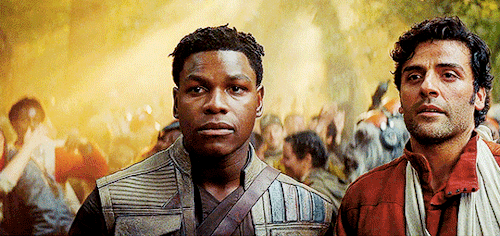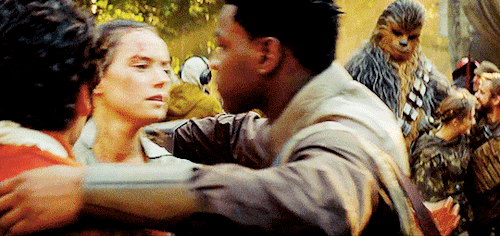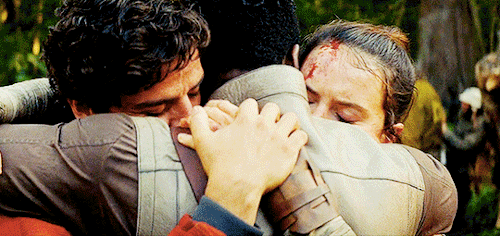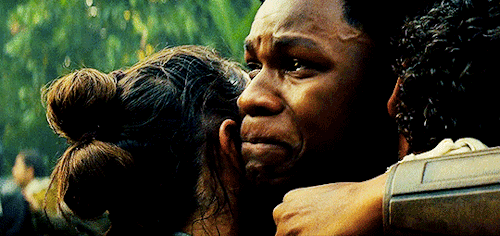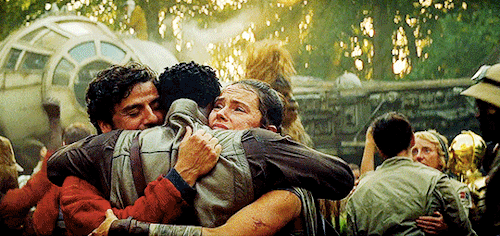Do You Ever Think You'll Stop Drawing Fanart? No Offense It Just Seems Like The Kind Of Thing You're
Do you ever think you'll stop drawing fanart? No offense it just seems like the kind of thing you're supposed to grow out of. I'm just curious what your plans/goals are since it isn't exactly an art form that people take seriously.
Ah, fanart. Also known as the art that girls make.
Sad, immature girls no one takes seriously. Girls who are taught that it’s shameful to be excited or passionate about anything, that it’s pathetic to gush about what attracts them, that it’s wrong to be a geek, that they should feel embarrassed about having a crush, that they’re not allowed to gaze or stare or wish or desire. Girls who need to grow out of it.
That’s the art you mean, right?
Because in my experience, when grown men make it, nobody calls it fanart. They just call it art. And everyone takes it very seriously.
More Posts from Lune-versatile and Others
Some questions for your OC
What secret is your character keeping and why?
What is your character's greatest regret and how has it shaped their life?
How does your character react under extreme stress?
What would make your character tell a lie?
What is your character's biggest vulnerability?
What personal philosophy or mantra does your character live by?
What is your character most proud of?
What does your character value most in their friendships?
What kind of relationship does your character have with their family?
What goals does your character have for the next five years?
What does your character do to relax?
How does your character change when they are alone?
What kind of first impression does your character usually make?
What does your character think about before falling asleep at night?
What is your character most sensitive about regarding criticism?
Helloooo! Do you have a particular method or tips for when creating and developing a character?
Hi :)
Sorry this took me some time, but there is so much I could talk about here. So I try to go with some basics.
How to create a character
Make a character sheet
some examples for what I usually try to find out about my characters, regardless which genre I’m writing in
basics
name, age, place of birth, where they live, nationality, ethnicity, education, occupation, religious affiliation, financial status, gender identity, sexual orientation
physical appearance
eye, hair and skin colour
distinguishing features (tattoos, birthmarks, scars, visible disabilities,...)
height and weight (proportions!)
walk (slow, fast, skipping,...)
tics and mannerisms (touching their face, blinking, grinding their teeth,...)
speech patterns and communication style
talk (slow, fast, slurred etc.)
accents and dialects
using slang, sounding educated, trying to hide a dialect/accent etc.
do they talk with their whole body? (gestures?)
extra question for speech and physical appearance: can people tell where the character is coming from and what influences they have from their heritage?
past and present
how did they grow up?
happy memories
academic career
hobbies
past trauma or important turning points that still influence their life
specific lifestyle
social and political ideology
future
dreams and goals
expectations from themself and from outside
Relationship maps
for longer stories it’s even more important to understand your characters relationships to each other
two different approaches:
1. proper list of family, friends, love interests, “enemies”, everyone else
family
who is still alive and where do they live?
who did they grow up with?
what was and what is their relationship?
friends
how long do they know each other?
would they trust them with a secret?
how close are they?
love interests
what is their relationship status?
what do they like about them?
is it reciprocated?
if they are not together why not?
“enemies”
how do they know each other?
what do they not like about each other?
did they always hate each other?
can their relationship become better?
2. love, like, hate categories
make a list of people your character loves (use the different forms of love: romantic, familial, friendly,...)
make a list of acquaintances
make a list of people they dislike and people who dislike them
you could even try to draw their relationships with each other
make sure you include if the relationship changes throughout your story
Those are just some basic things I could think of that I usually like to write down about my characters. Depending on the story there are some variations of this and more information about specific topics.
Pro tip for developing your characters: write short stories or little sequences with your characters that don’t neccessarily have anything to do with your story. I think of it as fanfiction of your own work. Put your characters with their intended roles and relationships in different situations and just write and let it play out. This is a good tool to find out if and how the characters work together. And it can even give you new ideas for their relationships to each other and new skills or habits for your characters. It’s basically a test run for your cast before you go into your bigger story.
And one last important thing: don’t get too stuck on an idea. Characters can sometimes develop a life of their own. You don’t always have a conscious control over them. So don’t be afraid to change it if something is not working out or you find something else that is working even better.
This took me such a long time and I hope it makes sense and helps you with your writing. Good luck!
- Jana
Advice for planning your story
Plotting out a story is an essential step in bringing your ideas to life and creating a compelling narrative. Here are some valuable tips that I personally find helpful to effectively plot out new story ideas <3
1. Start with the basics: Begin by identifying the key elements of your story – the main characters, setting, and central conflict. Understand who your characters are, what they want, and what obstacles they will face. This foundation will serve as a solid starting point for your plot.
2. Outline the major plot points: Once you have a clear understanding of your story's foundation, outline the major plot points. These are the significant events or turning points that drive the story forward. Consider the introduction, inciting incident, rising action, climax, falling action, and resolution. This structure will give your story a sense of direction and progression.
3. Create a timeline: Develop a timeline or sequence of events that organizes the flow of your story. This helps you visualize the progression of events and ensures a logical and coherent narrative. Consider the cause-and-effect relationship between different plot points and how they impact your characters' journey.
4. Use storyboarding or visual aids: Visual aids, such as storyboards or visual diagrams, can be helpful for visual thinkers. Create a visual representation of your story's structure, mapping out the key scenes, character arcs, and plot developments. This can provide a clear overview and help you spot any gaps or inconsistencies.
5. Balance pacing and tension: As you plot out your story, consider the pacing and tension. Ensure that your story has a good balance of slower, introspective moments and high-stakes, action-packed sequences. Introduce obstacles and conflicts that keep readers engaged and eager to turn the pages.
6. Allow for flexibility: While it's important to have a solid plot outline, don't be afraid to deviate or adapt as you write. Sometimes, characters surprise you or new ideas emerge during the creative process. Stay open to these possibilities and be willing to adjust your plot if it serves the story better.
7. Revise and refine: Plotting is an iterative process. Once you have a draft of your plot, review it critically. Look for areas that may need more development, pacing adjustments, or additional conflict. Refine your plot to ensure it aligns with your overall story vision.
Remember, plotting is a guide, not a rigid framework. It's there to help you stay organized and focused, but don't be afraid to let your creativity flow and explore unexpected avenues. With practice and experimentation, you'll become more adept at plotting out your story ideas and creating narratives that captivate readers <3
hey do you have any tips on how to write surreal horror (mostly short stories?) it's a genre that i've really been interested in trying to write, but i'm not too sure how to go about it (and thanks for providing such a useful blog :D)
I love surreal horror.
Okay.
Plot twists are your best friend. Do the unexpected. Do a 180 last second, turn everything around on the reader. Obviously it has to be believable with in the context of the story, but keep it a surprise.
False sense of security? Works wonders. Nothing is safe. Let readers think something is good/pure/innocent/calm/safe/helpful/etc when it’s not. Lure them into that trap. Let them believe and then rip it away from them.
Invert things. Similar to the false sense of security. Take things that are usually strongly associated with one thing, and associate it with the opposite. Take something dark and make it the good thing. Take something bright and make it evil. Take something sweet and make it bitter. Take something healthy and make it deadly. If you do it right, you can make the reader curiously uncomfortable.
With surreal horror you want to shock your reader. You want to make them feel strangely uncomfortable. You want to make them question things.
Hope that helps :)
Types Of Writer’s Block (And How To Fix Them)
1. High inspiration, low motivation. You have so many ideas to write, but you just don’t have the motivation to actually get them down, and even if you can make yourself start writing it you’ll often find yourself getting distracted or disengaged in favour of imagining everything playing out
Try just bullet pointing the ideas you have instead of writing them properly, especially if you won’t remember it afterwards if you don’t. At least you’ll have the ideas ready to use when you have the motivation later on
2. Low inspiration, high motivation. You’re all prepared, you’re so pumped to write, you open your document aaaaand… three hours later, that cursor is still blinking at the top of a blank page
RIP pantsers but this is where plotting wins out; refer back to your plans and figure out where to go from here. You can also use your bullet points from the last point if this is applicable
3. No inspiration, no motivation. You don’t have any ideas, you don’t feel like writing, all in all everything is just sucky when you think about it
Make a deal with yourself; usually when I’m feeling this way I can tell myself “Okay, just write anyway for ten minutes and after that, if you really want to stop, you can stop” and then once my ten minutes is up I’ve often found my flow. Just remember that, if you still don’t want to keep writing after your ten minutes is up, don’t keep writing anyway and break your deal - it’ll be harder to make deals with yourself in future if your brain knows you don’t honour them
4. Can’t bridge the gap. When you’re stuck on this one sentence/paragraph that you just don’t know how to progress through. Until you figure it out, productivity has slowed to a halt
Mark it up, bullet point what you want to happen here, then move on. A lot of people don’t know how to keep writing after skipping a part because they don’t know exactly what happened to lead up to this moment - but you have a general idea just like you do for everything else you’re writing, and that’s enough. Just keep it generic and know you can go back to edit later, at the same time as when you’re filling in the blank. It’ll give editing you a clear purpose, if nothing else
5. Perfectionism and self-doubt. You don’t think your writing is perfect first time, so you struggle to accept that it’s anything better than a total failure. Whether or not you’re aware of the fact that this is an unrealistic standard makes no difference
Perfection is stagnant. If you write the perfect story, which would require you to turn a good story into something objective rather than subjective, then after that you’d never write again, because nothing will ever meet that standard again. That or you would only ever write the same kind of stories over and over, never growing or developing as a writer. If you’re looking back on your writing and saying “This is so bad, I hate it”, that’s generally a good thing; it means you’ve grown and improved. Maybe your current writing isn’t bad, if just matched your skill level at the time, and since then you’re able to maintain a higher standard since you’ve learned more about your craft as time went on
HOW TO GIVE PERSONALITY TO A CHARACTER
Giving personality to a character is an essential part of character development in storytelling, whether you're writing a novel, screenplay, or creating a character for a role-playing game. Here are some steps and considerations to help you give personality to your character:
Understand Their Backstory:
Start by creating a detailed backstory for your character. Where were they born? What were their childhood experiences like? What significant events have shaped their life? Understanding their past can help you determine their motivations, fears, and desires.
2. Define Their Goals and Motivations:
Characters often become more interesting when they have clear goals and motivations. What does your character want? It could be something tangible like a job or a romantic relationship, or it could be an abstract desire like happiness or freedom.
3. Determine Their Strengths and Weaknesses:
No one is perfect, and characters should reflect this. Identify your character's strengths and weaknesses. This can include physical abilities, intellectual skills, and personality traits. Flaws can make characters relatable and three-dimensional.
4. Consider Their Personality Traits:
Think about your character's personality traits. Are they introverted or extroverted? Shy or outgoing? Kind or selfish? Create a list of traits that describe their character. You can use personality frameworks like the Myers-Briggs Type Indicator or the Big Five Personality Traits as a starting point.
5. Give Them Quirks and Habits:
Quirks and habits can make a character memorable. Do they have a specific way of speaking, a unique fashion style, or an unusual hobby? These details can help bring your character to life.
6. Explore Their Relationships:
Characters don't exist in isolation. Consider how your character interacts with others. What are their relationships like with family, friends, and enemies? These relationships can reveal a lot about their personality.
7. Show, Don't Tell:
Instead of explicitly telling the audience about your character's personality, show it through their actions, dialogue, and decisions. Let the reader or viewer infer their traits based on their behavior.
8. Create Internal Conflict:
Characters with internal conflicts are often more engaging. What inner struggles does your character face? These can be related to their goals, values, or past experiences.
9. Use Character Arcs:
Consider how your character will change or grow throughout the story. Character development is often about how a character evolves in response to the events and challenges they face.
10. Seek Inspiration:
Draw inspiration from real people, other fictional characters, or even historical figures. Study how people with similar traits and backgrounds behave to inform your character's actions and reactions.
11. Write Dialogue and Inner Monologues:
Writing dialogue and inner monologues from your character's perspective can help you get inside their head and understand their thought processes and emotions.
12. Consider the Setting:
The setting of your story can influence your character's personality. For example, a character who grows up in a war-torn environment may have a different personality than one raised in a peaceful, affluent society.
13. Revise and Refine:
Don't be afraid to revise and refine your character as you write and develop your story. Characters can evolve and change as the narrative unfolds.
Remember that well-developed characters are dynamic and multi-faceted. They should feel like real people with strengths, weaknesses, and complexities. As you write and develop your character, put yourself in their shoes and think about how they would react to various situations. This will help you create a compelling and believable personality for your character.
It’s very humbling when you’re reading a book —part of a trilogy, very acclaimed— and the only thing you can think of is ‘the fanfic I read the other day was better’

-
 carebear62623 liked this · 3 weeks ago
carebear62623 liked this · 3 weeks ago -
 emstargazer reblogged this · 1 month ago
emstargazer reblogged this · 1 month ago -
 emstargazer liked this · 1 month ago
emstargazer liked this · 1 month ago -
 sheena-is-a-punk-rocker liked this · 1 month ago
sheena-is-a-punk-rocker liked this · 1 month ago -
 amariemelody reblogged this · 1 month ago
amariemelody reblogged this · 1 month ago -
 thereyvan reblogged this · 1 month ago
thereyvan reblogged this · 1 month ago -
 shadow-king-club liked this · 1 month ago
shadow-king-club liked this · 1 month ago -
 basiate-culos-meos reblogged this · 1 month ago
basiate-culos-meos reblogged this · 1 month ago -
 spooknoodle4 liked this · 2 months ago
spooknoodle4 liked this · 2 months ago -
 not-a-li liked this · 2 months ago
not-a-li liked this · 2 months ago -
 deadwoodday liked this · 2 months ago
deadwoodday liked this · 2 months ago -
 notinterestedreallynot liked this · 2 months ago
notinterestedreallynot liked this · 2 months ago -
 widows-writings reblogged this · 3 months ago
widows-writings reblogged this · 3 months ago -
 widows-writings liked this · 3 months ago
widows-writings liked this · 3 months ago -
 dreamingofsomethingdifferent liked this · 3 months ago
dreamingofsomethingdifferent liked this · 3 months ago -
 mc-tummy-blur reblogged this · 3 months ago
mc-tummy-blur reblogged this · 3 months ago -
 polgarawolf1 liked this · 3 months ago
polgarawolf1 liked this · 3 months ago -
 movetothemusic reblogged this · 3 months ago
movetothemusic reblogged this · 3 months ago -
 thepalehorsevictoria liked this · 3 months ago
thepalehorsevictoria liked this · 3 months ago -
 bearfeathers reblogged this · 3 months ago
bearfeathers reblogged this · 3 months ago -
 lywinis reblogged this · 3 months ago
lywinis reblogged this · 3 months ago -
 crhodey reblogged this · 3 months ago
crhodey reblogged this · 3 months ago -
 fortheloveoftrousers liked this · 3 months ago
fortheloveoftrousers liked this · 3 months ago -
 stoneantler liked this · 3 months ago
stoneantler liked this · 3 months ago -
 charlie-badassbury liked this · 3 months ago
charlie-badassbury liked this · 3 months ago -
 letmeputsomethinghere reblogged this · 3 months ago
letmeputsomethinghere reblogged this · 3 months ago -
 badbobshipsit reblogged this · 3 months ago
badbobshipsit reblogged this · 3 months ago -
 luhans-baozi reblogged this · 3 months ago
luhans-baozi reblogged this · 3 months ago -
 chaosandwolves reblogged this · 3 months ago
chaosandwolves reblogged this · 3 months ago -
 chaosandwolves liked this · 3 months ago
chaosandwolves liked this · 3 months ago -
 gilraina liked this · 3 months ago
gilraina liked this · 3 months ago -
 asweetandstrangeunquietgrow reblogged this · 3 months ago
asweetandstrangeunquietgrow reblogged this · 3 months ago -
 asweetandstrangeunquietgrow liked this · 3 months ago
asweetandstrangeunquietgrow liked this · 3 months ago -
 aceoftigers reblogged this · 3 months ago
aceoftigers reblogged this · 3 months ago -
 brittaunfiltered liked this · 3 months ago
brittaunfiltered liked this · 3 months ago -
 what-alchemy reblogged this · 3 months ago
what-alchemy reblogged this · 3 months ago -
 notfknapplicable reblogged this · 3 months ago
notfknapplicable reblogged this · 3 months ago -
 blogblog7 liked this · 3 months ago
blogblog7 liked this · 3 months ago -
 dertypmitderkiste liked this · 3 months ago
dertypmitderkiste liked this · 3 months ago -
 spiky-ironeyes liked this · 3 months ago
spiky-ironeyes liked this · 3 months ago -
 nymeria727 liked this · 3 months ago
nymeria727 liked this · 3 months ago -
 lostinthewanderingblue liked this · 3 months ago
lostinthewanderingblue liked this · 3 months ago -
 limpthislovearound-blog liked this · 3 months ago
limpthislovearound-blog liked this · 3 months ago -
 itwillhauntyoumyhoneybee liked this · 3 months ago
itwillhauntyoumyhoneybee liked this · 3 months ago -
 context-blues liked this · 3 months ago
context-blues liked this · 3 months ago -
 letlionslie reblogged this · 3 months ago
letlionslie reblogged this · 3 months ago -
 hakanaihime reblogged this · 3 months ago
hakanaihime reblogged this · 3 months ago -
 hakanaihime liked this · 3 months ago
hakanaihime liked this · 3 months ago -
 machi-kun liked this · 3 months ago
machi-kun liked this · 3 months ago


